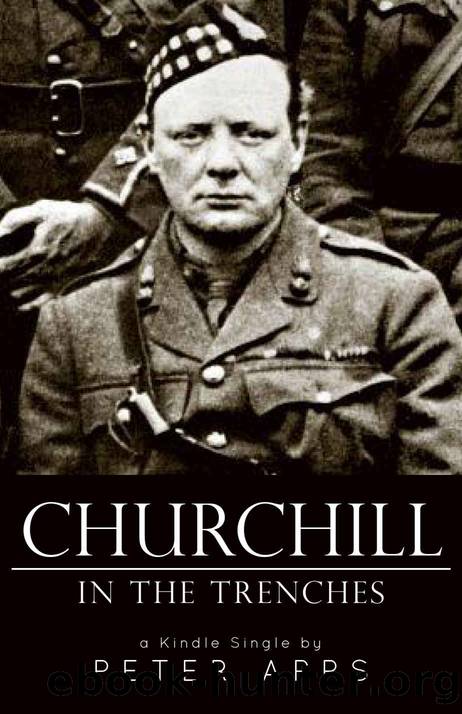Churchill in the Trenches (Kindle Single) by Peter Apps

Author:Peter Apps [Apps, Peter]
Language: eng
Format: azw3
Published: 2015-10-10T16:00:00+00:00
Chapter 5 – Shelling and Snow
The world Churchill now inhabited was shared with millions of soldiers of all sides. Their experiences would define a generation and shape the rest of the century.
“Before the war it had seemed incredible that such terrors and slaughters, even if they began, could last more than a few months,” Churchill would write in 1927. “After the first two years it was difficult to believe that they would ever end.”
As the Fusiliers settled into Ploegsteert, a twenty-six-year-old Adolf Hitler was serving as a runner on the Somme. In the skies overhead, Herman Goering flew with Manfred von Richtofen, the legendary “Red Baron.” Future French leader Charles de Gaulle would shortly arrive at Verdun commanding a company. And in the trenches of the Eastern front, Russian troops were on the brink of mutiny that would fuel a revolution.
In their early years in the Army, Churchill and his contemporaries had lamented that the age of great European wars had been over more than a century. "Fancy being 19 in 1793 with more than 20 years of war against Napoleon in front of one," he would later recall thinking. "What splendour we should have had."
The reality, he wrote home, was wretched.
“The same conditions and features reproduce themselves in every section,” Churchill told Clementine on March 17. “Shattered buildings, sandbag habitations, trenches heavily wired, shell holes, frequent graveyards with thickets of little crosses, wild rank growing grass, muddy roads, khaki soldiers—and so on for hundreds and hundreds of miles…Miserable Europe.”
Their initial spell in the front line had been only forty-eight hours. Thereafter, the Fusiliers would spend six days in and six out. It was a broadly typical pattern—the average British soldier would spend perhaps 100 days a year in the trenches, the rest in training or reserve. The reserve positions at “Plugstreet,” however, were so close to the front that they too would be under near perpetual shellfire.
In his letters home, Churchill did his best to reassure Clementine. The German gunners were predominantly targeting British artillery pieces nearby, he said, and so the town itself was struck relatively little. As the days and weeks progressed, however, that line became ever less tenable.
Some shells were already coming too close for comfort. One landed particularly close by the convent just after he had emerged from his bath, he told his mother in a letter, sending soot cascading down the chimney into his room and all over him.
“I am increasingly fatalistic in my moods…and do not worry at all at the dangers when they come,” he told her. Only the greater picture of the war—and his inability to affect it—continued to depress him. “I only fret when I think of the many things that ought to be done and my real powers are unused at this great time.”
Still, he remained the leading celebrity on his sector of the front and there were no shortage of visitors willing to brave the danger to see him.
His first senior visitor was F.E. Smith, a longtime political ally, then Attorney General and one of his few true close friends.
Download
This site does not store any files on its server. We only index and link to content provided by other sites. Please contact the content providers to delete copyright contents if any and email us, we'll remove relevant links or contents immediately.
| Afghan & Iraq Wars | American Civil War |
| American Revolution | Vietnam War |
| World War I | World War II |
Waking Up in Heaven: A True Story of Brokenness, Heaven, and Life Again by McVea Crystal & Tresniowski Alex(37004)
Empire of the Sikhs by Patwant Singh(22173)
We're Going to Need More Wine by Gabrielle Union(18074)
Hans Sturm: A Soldier's Odyssey on the Eastern Front by Gordon Williamson(16636)
Leonardo da Vinci by Walter Isaacson(11903)
The Radium Girls by Kate Moore(10907)
Educated by Tara Westover(7063)
Tools of Titans by Timothy Ferriss(6950)
How to Be a Bawse: A Guide to Conquering Life by Lilly Singh(6693)
The Last Black Unicorn by Tiffany Haddish(5075)
Permanent Record by Edward Snowden(4999)
The Rise and Fall of Senator Joe McCarthy by James Cross Giblin(4845)
Promise Me, Dad by Joe Biden(4449)
The Wind in My Hair by Masih Alinejad(4424)
The Crown by Robert Lacey(4105)
A Higher Loyalty: Truth, Lies, and Leadership by James Comey(4033)
The Iron Duke by The Iron Duke(3639)
Joan of Arc by Mary Gordon(3259)
How to be Champion: My Autobiography by Sarah Millican(3186)
